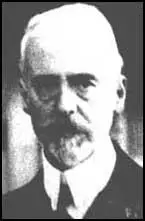Henry Wickham Steed

Henry Wickham Steed, the second son of Joshua George Steed, a solicitor's clerk, and his wife, Fanny Wickham, was born in Long Melford, Suffolk, on 10th October, 1871. He was educated at Sudbury Grammar School, but failed his entrance examination for the civil service. However, his father arranged for him to work in the offices of his friend, William Cuthbert Quilter. Steed also contributed articles to the Pall Mall Gazette.
In 1892 he studied economics, philosophy, sociology, and history at the University of Berlin. The following year he attended the University of Paris. He met Joseph Pulitzer who appointed Steed as the Paris correspondent for his New York World. In 1896 he went to work as a foreign correspondent for The Times. His biographer, A. J. A. Morris, pointed out: "Barely twenty-five years old, Steed revelled in his demanding appointment. He alone recognized Bismarck as the author of an anonymous newspaper article revealing that the reinsurance treaty had been signed with Russia without the knowledge of Germany's diplomatic partners. Without ruffling relations with German officials, he sent detailed reports of the Leckert von Lutzow libel action that discredited the Kaiser, his court, the foreign office, and the secret police."
In June 1897 Steed became the newspaper's Rome correspondent. He was highly critical of the Vatican's policies in his reports. Steed admitted in his autobiography: "I have ever been partisan... A partisan of England… of ordered freedom as against tyranny or licence; of reality against humbug and pretence… of men whom I thought honest."
Steed moved to Vienna in November 1902. He was an early critic of Emperor Franz Josef and two months ahead of the event, he forecast Austria's annexation of Bosnia-Herzegovina. When it was rumoured that he might transfer to Berlin, the pro-German lobby at the Foreign Office complained that this would be "disastrous… a red rag to the Teutonic bull".
In 1919 Lord Northcliffe appointed Steed as head of the foreign department of The Times. According to A. J. A. Morris: "In June 1914 the Austrian embassy sought to mislead and muzzle Steed, the most knowledgeable commentator on their country. Steed nevertheless insisted that the Austrians would attack Serbia, and he dictated the line taken by The Times up to the outbreak of war, which in turn was followed by the rest of the Unionist press."
During the First World War Steed worked closely with Northcliffe, in attempting to influence the governments of Henry Asquith and David Lloyd George. In February 1919 Steed became editor of The Times. The following month Steed drafted a memorandum with which Northcliffe fully concurred. In effect he argued "that any government seeking the support of The Times should follow the dictates of the newspaper."
In the summer of 1922 Steed and The Times were fully engaged in a battle to oust Lloyd George from 10 Downing Street and bring an end the coalition. He also played an important role in the election of Andrew Bonar Law. After Northcliffe's death in August 1922, the paper's new owners, John Jacob Astor, replaced Steed with Geoffrey Dawson as editor of the newspaper. The following year he became editor of Review of Reviews, the journal that had been established by William Stead in 1890.
A strong opponent of Adolf Hitler and Nazi Germany, Steed argued that appeasement would be unsuccessful and in his book, Vital Peace (1936) he repudiated neutralism. He was also a regular broadcaster on world affairs for both overseas and domestic services of the BBC.
Henry Wickham Steed died at his home, Holly Bank, Wootton, on 13th January 1956.
